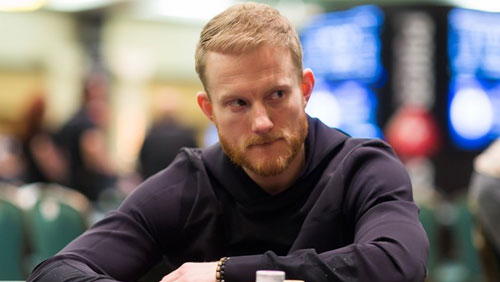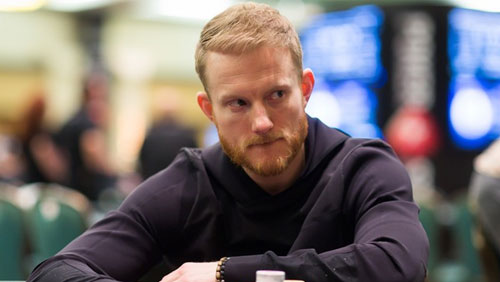It took Chris “Jesus” Ferguson about seven years to issue a 42-second video apology for the Full Tilt Poker fiasco. Hopefully he wasn’t working on writing it the entire time. …
Hatch Twists Facts On Sports Betting In Effort To Keep Federal Control
Apparently United States Senator Orrin Hatch doesn’t think much of the people he represents.
In an op-ed posted on the Sports Illustrated website this week, the senior US Senator for Utah basically says without federal controls on sports gambling, Americans are bound to start fixing games, bribing players and referees, and attacking the integrity of sports in this country from every angle.
He even cites examples including the fixing of the 1919 World Series, Pete Rose’s expulsion from baseball and the point-shaving scandal at Boston College as proof they’ve done it before and will likely do it again.
It’s a rather grim view of the many millions in this country who watch and bet on sports regularly. Plus, it ultimately ignores several facts about sports gambling in the US altogether.
Hatch’s issue is with last week’s Supreme Court decision declaring the Professional and Amateur Sports Protection Act (PASPA) unconstitutional. Hatch actually wrote PASPA almost 25 years ago. A law he says was an effort to insulate sports from the corrupting influences of gambling.
The Supreme Court decision ultimately said it was up to states to decide if they want sports betting or not. A decision that opens the door for all 50 to launch legal sports betting inside their borders. And, one Hatch says upends decades of an established law that has served to protect the integrity of sports.
Will legal sports betting create corruption?
In fact, with PASPA gone and legal sports gambling set to spread across the nation, Hatch says the likelihood that players will be exposed to bribes, exploitation, and other forms of corruption is bound to rise exponentially. Particularly, he says, considering the internet makes it all but impossible to enforce sports betting laws across state lines.
What Hatch fails to recognize is that modern Geolocation software can now perform that task.
Plus, all PASPA really did was push sports betting underground. The American Gaming Association estimates the federal ban on sports betting PASPA created helped build a $150 billion a year illegal sports betting market in the US.
What that means is that sports betting is already going on in this country in a big way. It’s happening on offshore online sportsbooks, and through illegal bookmakers often connected to organized crime. PASPA actually led to the rise of an underground and illegal gambling industry much more likely to be tainted by corruption and scandal than a legal one would ever be.
The Supreme Court decision declaring PASPA unconstitutional didn’t invent the activity of betting on sports. It just gave states the right to legalize and regulate it. Which, when you really think about it, will probably bring with it enough government oversight to help prevent the problems Hatch is talking about.
Of course, Hatch figures the opposite is true. He even says PASPA has curtailed illegal gambling activities and kept the social ills associated with sports betting at bay more than any bill written in the last several decades. An assertion that completely disregards the facts about the rise of illegal gambling in this country under it.
Play At Golden Nugget Now With Free Signup Bonus
-
 Visit Golden Nugget
Visit Golden Nugget- $20 FREE100% UP TO $1000
- Golden Nugget ReviewOverall Grade A
- Bonus A+
- Games A
- Support A
- Banking B+
Does Congress need to get involved in betting?
Hatch isn’t saying he wants to bring back a federal ban on sports betting declared unconstitutional just last week. He is agreeing each state should decide for itself whether to legalize sports gambling and how to regulate it. Hatch just wants Congress to pass legislation establishing minimum standards. He says they need to protect consumers, deter illegal bookmaking, and empower states that choose not to legalize sports gambling.
Ultimately, Hatch says his goal is to protect the integrity of sports and guide states considering sports betting.
Hatch says Congress needs to act for the sake of the athletes, the fans and the games themselves. Which, on the surface, sounds like a fair compromise.
Unfortunately, it also sounds like Congress must ignore the facts about previous federal sports betting laws to do it. Plus, they’ll need trample all over state rights. In particular, a right just handed back to states by the Supreme Court last week.
Hatch will be retiring at the end of this session of Congress. Perhaps this is all in an effort to protect his legacy in the wake of PASPA’s repeal. Unfortunately, it’s only tarnishing it. He’s starting to look like one of the athletes he claims he’s trying to protect. The kind that’s obviously beat and simply refuses to admit it.
The post Hatch Twists Facts On Sports Betting In Effort To Keep Federal Control appeared first on Play USA.
Let’s Talk About PA’s Insanely High Sports Betting Tax
Pennsylvania lawmakers deserve some credit for putting their state on the leading edge of this trend toward sports betting.
The legislature passed an enabling law last year, even before the US Supreme Court considered overturning the federal ban known as PASPA. That prohibition is no longer on the books, and PA sports betting is legal pending final regulations.
Casino operators aren’t exactly lining up at the license office in anticipation, though. The specifics of the PA law leave a lot to be desired, clipping the industry’s wings before it even tries to fly.
Here’s how host Matt Brown put it on the most recent episode of TheLines podcast:
“Pennsylvania is kind of a wild card this year. The regulations for sports betting currently in place are… concerning.”
What’s wrong with them? We’ll explain.
PA gets aggro with gambling taxes
As the saying goes, two things in life are certain: Death and high gambling taxes in PA.
The state’s expansion into these new formats will be taxed at a rate that raises serious questions about sustainability. As the law is written, sportsbooks will have to pay 36 percent of their revenue back to state and local coffers. That is a ridiculous number.
Compare that to Nevada, which has been refining its industry for almost 70 years. Nevada sportsbooks return 6.75 percent of their revenue to the state, and things work just great. Operators make a little profit, the state collects tens of millions of dollars, and bettors get to do what they do in a regulated environment.
PA operators will pay more than five times the tax rate in Nevada, a serious disincentive for some operators.
Spokesman Eric Schippers says Hollywood Casino isn’t even sure it wants sports betting under those terms. “We haven’t made a final determination on whether to pursue what is the highest rate on the planet for sports betting,” he told Penn Live.
A couple states (like Delaware and Rhode Island) will offer sports betting through more lopsided revenue-sharing agreements with their lotteries. Those are exceptions to the rule, though. Most states are proposing something between 7-15 percent.
It’s also worth mentioning that the oppressive taxation won’t be limited to sports betting. PA will tax online slot revenue at 54 percent, more than twice the rate at which operators say they feel comfortable. Slot play accounts for around three-quarters of total online gambling revenue in existing markets.
By way of another comparison, New Jersey taxes online slot revenue at 17.5 percent.
A high bar to entry for casinos too
The recurring costs are unfriendly, but some operators might not even be able to squeeze in the door. Obtaining a PA sports betting license requires operators to overcome the tallest hurdle in any US market, existing or proposed.
Like tax rates, there is no state standard for licensing fees. As an example, Indiana recently considered a bill with a proposed fee of just $5,000. There are some big ones, too, including the $5 million suggested in one Illinois bill. In broad terms, a couple hundred thousand dollars seems to be within the range across most states.
PA sports betting licenses will cost $10 million apiece, though, larger than any other proposal. The tax rate makes the market unappealing from the start, and the up-front fee will be a dealbreaker for some properties.
As the smallest PA casino, Lady Luck Nemacolin is a good example. The property generated around $20 million in total revenue last year, so there’s almost no way it would front the money for a license. Its only real path to sports betting would involve a partnership with an existing operator.
It’s not just the little guys, though. Hollywood Casino tallied more than $100 million in revenue last year, and it seems to have a good foothold on its market. Still, giving away $10 million is not a high priority. Schippers said that if Hollywood does offer sports betting, it would try to do so on the cheap. “The state has strangled the goose on this one,” he said.
There’s also some disparity between the licensure for sports betting and other forms of online gambling. Casinos will pay $4 million for a license in each of these game types:
- Slot machines
- Table games
- Poker
While each of these separately cost $4 million, for $10 million, a property can purchase all three. So, casinos can spend the same amount of money to offer sports betting as they would to offer every form of iGaming.
So what? The state needs money
Yes, it certainly does. The fact that Pennsylvania has been operating under a budget shortfall is the only reason we even have a sports betting law to pick on.
This is the issue, though. Rather than viewing expanded gambling as an amenity for casinos, the state took it as an opportunity to plug its own leaks. Tax revenue is arguably the worst reason to allow expanded gambling, and that’s especially true for sports betting.
As any bookmaker (or bettor) will tell you, sports gambling has some of the tightest margins in the industry. Although bettors plunked down almost $5 billion last year in Nevada, sportsbooks earned less than $250 million, holding around five percent of the total “handle.”
In simple terms, operators earn about a nickel on every dollar bet. And Pennsylvania will take back almost two cents of that in taxes. That take will be counterproductive to what should have been the primary reason for legalization.
Sports betting is unique in that operators aren’t competing against each other as much as they are competing against offshore sites. There’s something like $150 billion wagered in the US each year, and almost all of it is done through black/gray channels. In order to provide a tempting alternative, the regulated industry must provide similar convenience and competitive lines.
Convenience won’t be a problem as long as there is mobile wagering, but competitive lines might be. If bookmakers want to be profitable in PA, they’ll almost certainly have to pad their lines. And if PA lines aren’t competitive, those in the know will just keep betting with “their guy.”
By writing their greed and shortsightedness into law, PA lawmakers are actually doing the unregulated industry a bit of a favor.
The post Let’s Talk About PA’s Insanely High Sports Betting Tax appeared first on Play Pennsylvania.
Latest Report By Rutgers Sheds Some Light On New Jersey Online Gamblers
Rutgers University Center for Gambling Studies released its annual report on NJ online gambling, the fourth produced since online poker and casino launched in November 2013.
The post Latest Report By Rutgers Sheds Some Light On New Jersey Online Gamblers appeared first on Play NJ.
Jason Koon Talks About His €2 Million Cash Game Pots, $3.5 Million Tournament Win
The high-stakes pro, who recently booked his biggest wins in the Triton Super High Roller Series was the latest guest of the Joe Ingram Poker Life Podcast.

Civil Rights Case Involving California Casino Goes Awry, Lawyer Says
A jury in California has put visitors to California’s casinos at risk of bodily harm thanks to a verdict in a civil rights trial. Per a report from the Fresno …
Jury Puts California Casino Visitors At Risk Of Bodily Harm With ‘Weirdest’ Verdict
A jury in California has put visitors to California’s casinos at risk of bodily harm thanks to a verdict in a civil rights trial. Per a report from the Fresno …
“Just Play”: Run It Once Reveals Blind Lobby, Fixed Buy-In Plans

All cash game tables will have a fixed 100 big-blind buy-in, and a blind lobby system will be in place.
Run it Once has released more details about its new poker site, stating that there will be a blind lobby for all games and a fixed buy-in system of 100 big blinds at all tables. Euros will be the sole currency used on the site.
The fixed buy-in system has been created in part to “force bankroll management” on both recreational and professional poker players and will be combined with a bind lobby system, dubbed “AutoSeat,” to create games that are fair, quick to join and fun to play, the company announced.
Darren Elias Wins Record Fourth World Poker Title
The $10,000 Bobby Baldwin Classic at ARIA in Las Vegas, Nevada put together a loaded field of 162 entrants for the last open event of Season XVI on the World Poker Tour.
The final table was one of the most decorated in the history of the World Poker Tour with eight combined WPT titles and a WSOP Main Event bracelet sitting among them.
WPT Champions Club member Darren Elias finished the job he started in Jacksonville earlier this season and won his record fourth title.
Final table lineup
Seat 1: Dietrich Fast – 801,000
Seat 2: Jonathan Little – 300,000
Seat 3: Sam Panzica – 566,000
Seat 4: Darren Elias – 2,127,000
Seat 5: Kitty Kuo – 683,000
Seat 6: Joe McKeehen – 385,000
Close but no cigar for many of poker’s best
Only 21 players made the money in the Bobby Baldwin Classic but the list of players who cashed reads like a Hendon Mob all-time money list rundown. Among those who almost made the final table were WPT Champions Jared Jaffee and Kevin Eyster. 2017 World Series of Poker Main Event final tablist Bryan Piccioli bowed out in 14th place, shy of his third career WPT final table.
U.S. Poker Open Champion Stephen Chidwick took ninth, setting himself up for a potential run in Super High Roller Bowl.
Phil Hellmuth almost made his second final table of Season XVI. Hellmuth lost with pocket tens to Elias’ queens to exit in seventh. Always entertaining, Hellmuth and Ray Qartomy exchanged words as captured by Little.
Still playing with 11 players in the @WorldPokerTour. At 700k. pic.twitter.com/IBpqABYgfq
— Jonathan Little (@JonathanLittle) May 23, 2018
Fast, Little, and Panzica fall shy of another title
The odds favored a repeat WPT winner based on the lineup of the Bobby Baldwin Classic final table. Elias was the only player with three but Panzica and Little both had the chance to win their third. Fast won the L.A. Poker Classic in Season XIV and the Bobby Baldwin Classic represented his first final table since.
Little took sixth after entering the final table as the shortest stack. Panzica took out Little when his ace-four paired up against Little’s ace-jack to send Little to the payout desk.
Panzica peaked when he busted Little and had a chance to accumulate more chips versus McKeehen. The two players flipped for 650,000 and McKeehen came out on top when his deuces beat Panzica’s ace-queen. McKeehen flopped a set and faded the broadway draw of Panzica by filling up on the turn. Panzica lost another flip to Elias a few orbits later to earn fifth place.
Second in chips when the final table started, Fast gained little traction and was eliminated by Kuo is rough fashion. Fast was all-in with pocket aces against Kuo’s nut flush draw on the flop. Kuo hit her flush on the turn and Fast waits another day for his second title.
New Players Get A Free Bonus At WSOP.com NJ
-
 Visit WSOP NJ
Visit WSOP NJ
- $10 No Deposit100% to $400 With Deposit
- WSOP NJ ReviewOverall Grade A-
- Games B+
- Support B
- Banking A-
- Player Value A
McKeehen misses history by inches
Needing to win the Bobby Baldwin Classic to overtake Art Papazyan for Player of the Year honors, McKeehen put forth a tremendous effort in pursuit of his first career WPT win.
McKeehen was a 70 percent favorite to be the chip leader with three players remaining but was cut down by Elias.
Elias opened the button to 45,000 and McKeehen kicked it up to 180,000 from the big blind. The three-bet was met by an all-in by Elias for 1,465,000 effective. McKeehen called with ace-queen and was in great shape against the ace-deuce of Elias.
The deck bailed out Elias when a deuce flopped and McKeehen would have to settle for his second third-place finish of Season XVI. McKeehen finished his campaign with three final tables and six cashes.
Elias closes out Kuo
Heads up play between Elias and Kuo opened with Elias holding a three-to-one chip lead. Kuo was game for the battle but couldn’t overcome destiny.
On the 103rd hand of heads-up play and 174th hand of the final table, Kuo was all-in for 600,000 with ace-five against the ace-ten of Elias. Kuo turned a straight draw but bricked the river and Elias locked up his fourth WPT win.
Final Table Results
1st: Darren Elias – $387,580
2nd: Kitty Kuo – $248,380
3rd: Joe McKeehen – $178,610
4th: Dietrich Fast – $130,895
5th: Sam Panzica – $97,795
6th: Jonathan Little – $74,520
Lead image courtesy of World Poker Tour/Flickr
The post Darren Elias Wins Record Fourth World Poker Title appeared first on .
Group Sues Sports Leagues For Almost $140M From NJ Sports Betting Case
The New Jersey Thoroughbred Horsemen’s Association wants to be reimbursed by the sports organizations that stopped the state’s racetracks and casinos from offering sports betting for years.
The post Group Sues Sports Leagues For Almost $140M From NJ Sports Betting Case appeared first on Play NJ.


